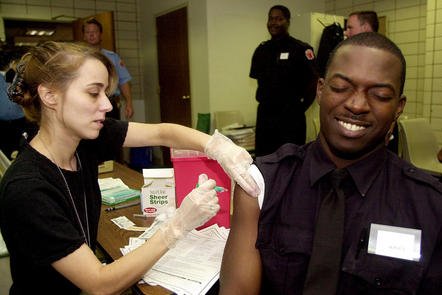U.S. officials have announced a new plan to tackle hepatitis B, which continues to be a public health challenge despite the availability of a vaccine. File photo by Bill Greenblatt/UPI
|
License Photo
Dec. 11 (UPI) -- Chronic hepatitis B, continues to sicken hundreds of thousands of Americans -- and millions globally -- despite the availability of a highly effective vaccine.
Now the U.S. National Institutes of Health has made research into its biology, as well as a potential cure, a new priority with the release Wednesday of the Strategic Plan for Trans-NIH Research to Cure Hepatitis B. The new plan defines a hepatitis B cure as a "sustained loss of a specific protein ... called hepatitis B virus surface antigen."
"Although treatments are available to control HBV infection, they must be taken for years if not for life," NIH said in a release announcing the new plan. "Additionally, high medication costs, the need for continuous disease monitoring and adhering to treatment regimens present significant burdens for people with chronic hepatitis B. Scientific discoveries within the past decade suggest that a hepatitis B cure is possible."
The agency did not respond to requests for comment on Wednesday.
Hepatitis B virus, or HBV, infection is transmitted through sex, contact with infected blood or bodily fluids, or from an infected mother to her baby, according to NIH. HBV can cause an acute infection that resolves fairly quickly or a chronic infection that, if left untreated, may persist for years and lead to serious health issues, including cirrhosis, liver failure or liver cancer.
The World Health Organization estimates that between 850,000 and 2 million people in the United States have chronic hepatitis B, while the disease affects more than 250 million people worldwide. Nearly 90 percent of infants infected during the first year of life will develop chronic infection, according to WHO, while 5 percent of those infected as adults will do so.
In the United States, an effective vaccine against hepatitis B has been available since the 1980s, yet the disease still claims more 600,000 lives worldwide annually, the U.S. Centers for Disease Control and Prevention estimates.
In general, the new strategic plan from NIH outlines efforts to bolster ongoing HBV research with the goal of finding a cure and "improving scientific understanding of the virus" while improving methods for screening for the disease. It is intended to build on the agency's ongoing hepatitis B research and the U.S. National Viral Hepatitis Action Plan, based on input from academia, patient advocacy organizations, private and non-profit companies, government organizations and clinical trial networks.
The plan emphasizes the importance of research efforts designed to better understand how the virus is transmitted as well as how and why some develop immunity against it. NIH also said new studies will ultimately identify a "biomarker" -- measurable through diagnostic testing -- for disease progression and response to therapy as well as new strategies for the prevention of new infections and/or transmission.
"Achieving a cure requires strengthening existing public health efforts for promoting hepatitis screening, ensuring that high-risk and under-served populations have access to vaccination and prioritizing follow-up to care and adherence to treatment, according to the plan," the NIH said. "Ideally, a hepatitis B cure would also reduce a persons risk of liver failure and liver cancer. To effectively address the global public health challenge posed by HBV, a curative treatment will need to complement better approaches to screening, follow-up care, and vaccination coverage.
Overall, the plan is designed to encourage the "development and sharing of tools and resources to support fundamental research and product development," the agency added.















